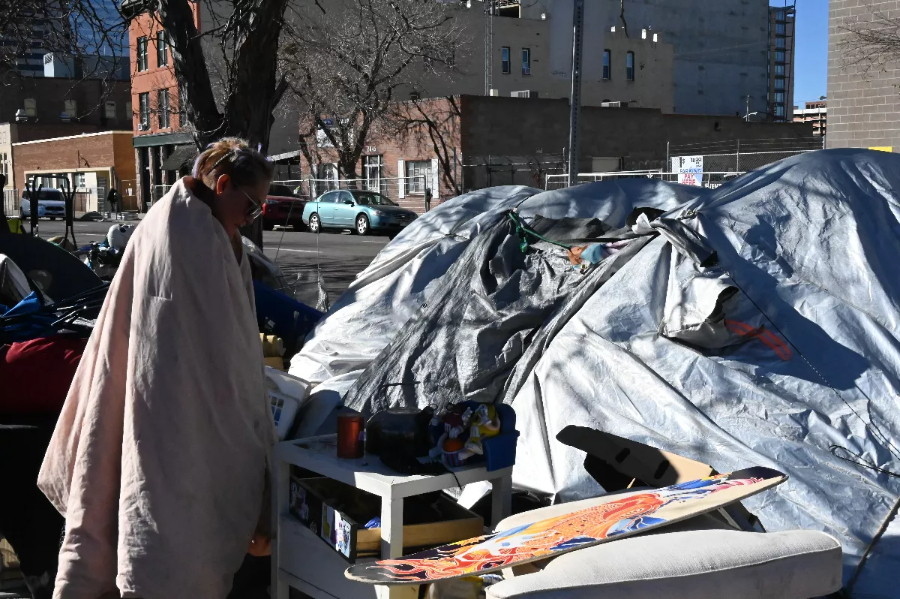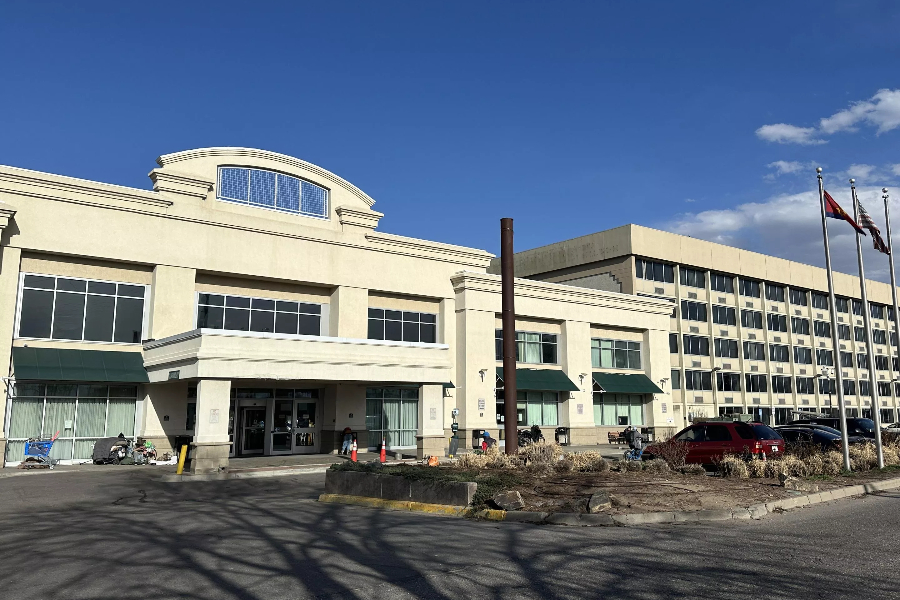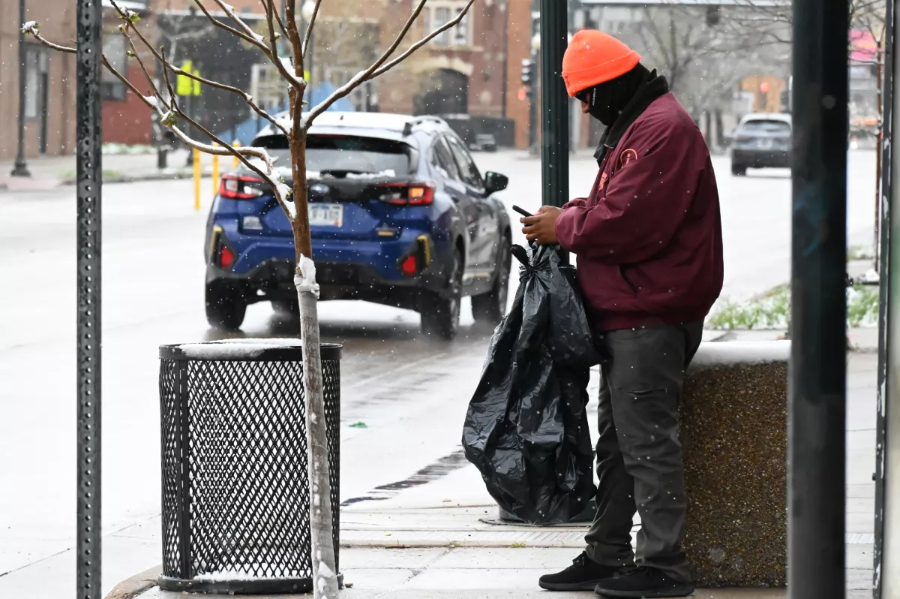
Bennito L. Kelty

Audio By Carbonatix
Denver City Council will consider major housing and homeless services contracts in the coming month, including two worth $33 million proposed by the Denver Department of Housing Stability (HOST) to work with Urban Alchemy, an embattled national nonprofit, for the next three years. Councilmembers are also considering contracts to install the St. Francis Center and Bayaud Works, both Denver-based organizations, as homeless service providers.
The new service providers would replace the Salvation Army, which announced earlier this year that it would no longer oversee three city-funded homeless shelters that were converted from old hotels as part of Mayor Mike Johnston’s All In Mile High (AIMH) plan.
HOST is proposing a two-year, $20 million contract for the St. Francis Center to run Stone Creek, a 182-unit former Best Western at 4595 Quebec Street, and a two-year, $14 million contract for Bayuad Works to run the Tamarac Family Shelter, a 205-unit former Embassy Suites at 7525 East Hampden Avenue.
Urban Alchemy expects to take over operations at Denver’s largest hotel shelter, a 300-unit former DoubleTree at 4040 Quebec Street now called the Aspen, for three years and $30 million. The city also plans to pay $3 million over the next three years for Urban Alchemy’s ambassador program, a street cleaning and engagement service similar to one the Ballpark General Improvement District employs near Coors Field.
The contracts for Bayaud Works, the St. Francis Center and Urban Alchemy received initial approval from council in October, and are expected to come before the full Denver City Council before the end of December, according to HOST.
Stepping in for the Salvation Army
In August, the Salvation Army announced it would step away as Denver’s main hotel shelter operator, explaining that it wasn’t financially or logistically feasible. However, protesters were already calling for the Salvation Army’s exit before it decided to depart. During the two years the Salvation Army ran the Aspen, the hotel shelter witnessed a double murder and caught criticism from the Denver Auditor for lax security and an employee sexually assaulting a resident. The Salvation Army will continue to operate the Aspen, Stone Creek and Tamarac Family Shelter until the end of the year.
The Salvation Army had contracts worth $53.5 million to operate AIMH hotel shelters over the past two years. The three contract proposals for its replacements total more than $64 million.
The proposed contracts are for the remainder of Johnston’s first term, by the end of which he’s promised to solve homelessness. (His office has boasted that he’s halfway there, but not everyone agrees with the assessment.) They’re the three largest contracts in total dollar amount among the nine currently in place to run the various AIMH sites, which include four hotel shelters and five micro-communities; the city expects to close two of those sites in the coming year.

Bennito L. Kelty
The new contracts were created under a performance-based model, so final payments to the three operators will be based on how they meet certain metrics, such as how many beds are in use throughout the year, how many people get case management meetings, and how well they move people through the street-to-housing pipeline, Mayor Mike Johnston said in September.
Councilmembers haven’t discussed the contracts publicly yet, but they are expected to next month — and they have forced HOST and the mayor’s office to backtrack on housing contracts before. In November 2023, the council delayed a vote to bring on the Colorado Village Collaborative to manage the largest micro-community, La Paz, after councilmembers felt too rushed by other city offices.
As the deadline approaches, here’s a closer look at the nominated hotel shelter operators and their proposed contracts.
Urban Alchemy
Founded in Los Angeles in 2018, Urban Alchemy describes itself as a “social enterprise.” The nonprofit has contracts with cities like Portland, San Francisco, Oakland, Los Angeles and Santa Fe, and is best known for running homeless shelters, including set-ups resembling Denver’s micro-communities. Urban Alchemy hires and trains people recovering from homelessness, addiction and incarceration for jobs in shelters or as street ambassadors, and has provided a service similar to Denver’s STAR program, in which mental health professionals respond to select emergency calls.
But as Denver mulls going into business with Urban Alchemy, other cities are having second thoughts about working with the nonprofit because of its lack of transparency. The City of Austin declined to renew contracts with Urban Alchemy in September, after it lied about how many people were successfully exiting its shelters.
That same month, the City of San Francisco determined that Urban Alchemy overspent money from contracts to give shelter staff pay bumps. City officials labeled the nonprofit an “increased risk to public funds” for poorly reporting data on employees in October, but downgraded its designation on November 21 after Urban Alchemy made changes to its record-keeping process.
The City of Los Angeles signed a $2.3 million contract with Urban Alchemy to provide 88 beds at a city-run shelter. On November 14, the Los Angeles Times reported that inspectors found only 44 beds, but the city is catching most of the heat for misreporting the numbers in court. The Birmingham, Alabama, city council delayed a vote on a $1.7 million, one-year contract with Urban Alchemy to run an addiction recovery facility; councilmembers were reportedly worried about a lack of transparency.
The Salvation Army, which collected bad headlines of its own in Denver, was awarded a $10 million contract in November 2023 to run the Aspen through 2024. Late last year, the city reduced the contract amount, which is paid out through reimbursement, to $9 million and extended it through March 2025. The city then extended the contract to have the Salvation Army run the hotel shelter through 2025 for $7 million. In total, the Salvation Army was awarded $26 million to open the shelter in November 2023 and run it through the end of 2025.
On November 18, the Denver City Council Community Planning and Housing Committee approved Urban Alchemy’s $30 million contract to run the Aspen, along with a $3 million deal to set up an ambassador program. Lana Dalton, the director of unsheltered homeless response for HOST, told councilmembers that Urban Alchemy’s Denver ambassadors would focus on “priority zones,” including downtown. According to Dalton, they’ll provide “public right-of-way cleaning services,” like moving people who might be blocking sidewalks, streets and alleys.

Bennito L. Kelty
The contract would bring in ten full-time Urban Alchemy ambassadors, according to Dalton. They’re expected to make nearly 800 referrals to homelessness services, as well as “engage with the general public…folks that could be wandering on the street and would like to know the best restaurant,” Dalton told councilmembers. In other cities, the ambassadors are used on a larger scale. According to the San Francisco Chronicle, Urban Alchemy ambassadors are “ubiquitous” in that city and patrol forty intersections, including in the famous Tenderloin neighborhood.
Councilmember Sarah Parady voted against the ambassador contract earlier this month, saying that providing such services “seems like something we should be doing.” Councilmember Shontel Lewis also voted against the contract, adding that she thought the ambassadors would just move around homeless residents already pushed out of downtown by Johnston’s sweeps. “We’re not going to solve what we’re trying to solve,” Lewis warned.
St. Francis Center & Bayaud Works
Bayaud Works and the St. Francis Center have been involved with the city’s All In Mile High program since they were granted contracts in December 2023 to operate the Stay Inn micro-community and Comfort Inn hotel shelter.
Denver-based company AC Disaster Consulting bought the nonprofit formerly known as Bayaud Enterprise in July, then transitioned it to for-profit status and renamed it. Bayaud Works now runs a 54-unit micro-community built in the parking lot of a 96-unit motel that the city bought in 2019 for $9 million but never used. Micro-communities are small clusters of single-room housing units shaped like sheds. In December, the council will consider a $1.8 million extension to keep Bayaud Works as the Stay Inn operator through 2026.
HOST is also proposing that Bayaud Works manage the Tamarac Family Shelter for two years and $14 million, $4.5 million less than what the Salvation Army received. City council’s Community Planning and Housing Committee approved the proposed contract on November 4.
The St. Francis Center already operates the 136-unit, never-renamed Comfort Inn at 4685 Quebec Street, but Mayor Johnston announced in September that the hotel shelter would close in March alongside the Monroe Village micro-community to help balance the budget amid a $200 million deficit. On November 24, the council approved a $775,000 extension to St. Francis Center’s current contract to run the shelter through the end of March and wind down operations.
HOST is offering the St. Francis Center a larger contract than what it paid the Salvation Army to run Stone Creek. In 2024, the city gave the Salvation Army $4.8 million to run Stone Creek and then another $4.2 million in 2025, while the St. Francis Center’s proposed contract of $20 million for three years averages out to about $6.7 million a year. The contract has yet to come before the full council but is on the December 2 agenda for the Community Planning and Housing Committee, with final action expected before the end of December.